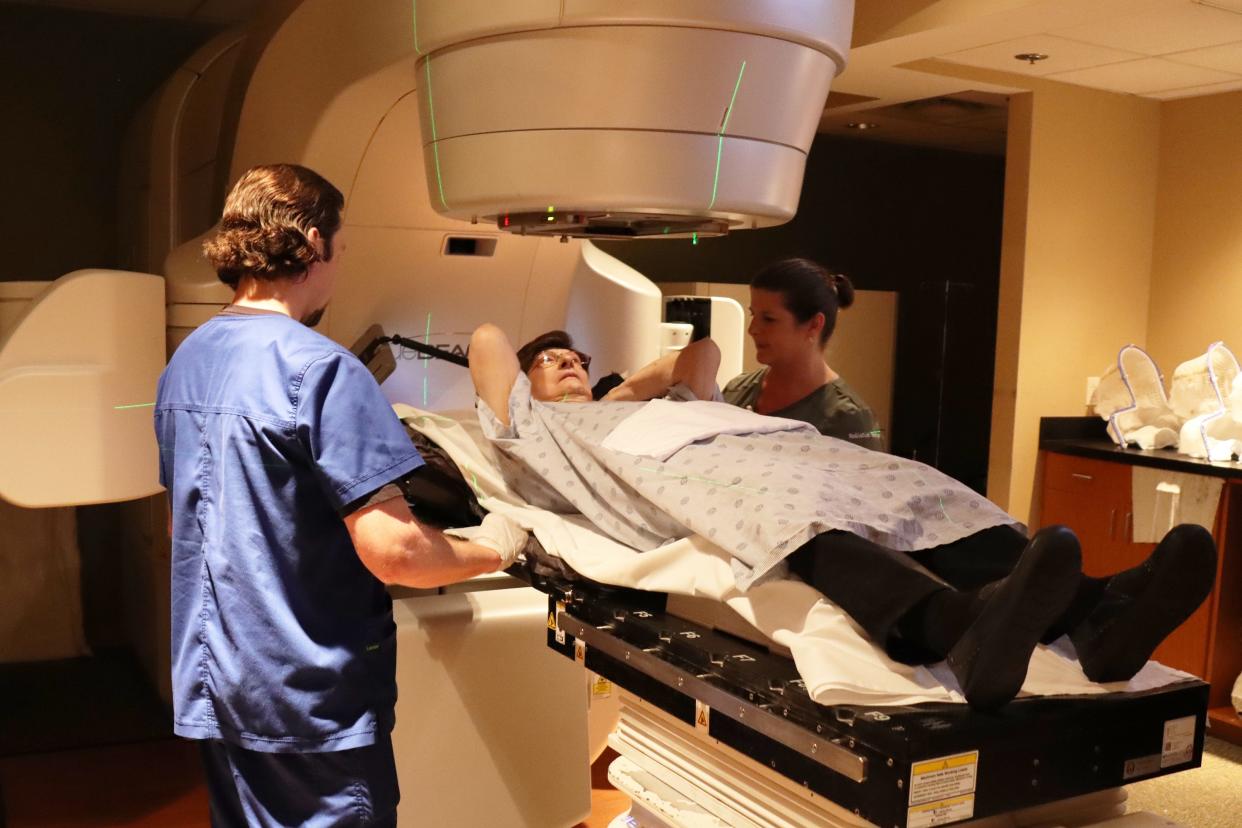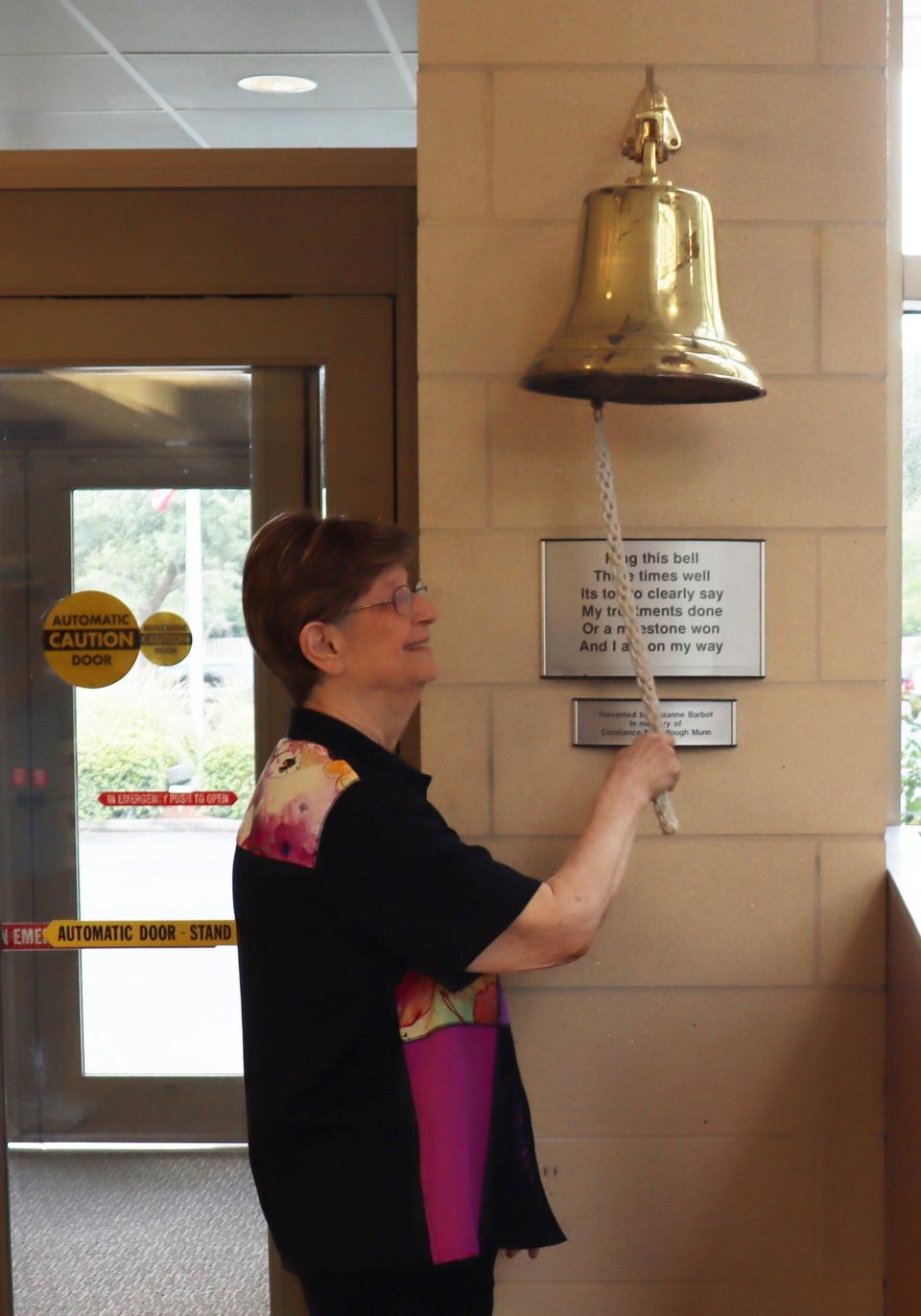'I'm a people lover': Cancer patient volunteers for clinical trials to help others

Cancer care is constantly improving at Lewis Cancer Research Pavilion and clinical trial participants play a key role in making this possible.
While some patients may be wary of participating in clinical trials, Alicia Weaver’s selfless nature overpowered any second thoughts. When her physician presented her with the opportunity to participate in a clinical trial to improve HER2-positive breast cancer treatment, Weaver didn’t hesitate for a moment.
“The first thing I asked them was, ‘If it helps me, will that help others?’ That was my main thing. I want the program to help other people,” Weaver said. “I’m a people lover.”
Weaver soon learned that a clinical trial is one of the best opportunities for people lovers in her situation. With six breast cancer clinical trials underway and four more on the horizon, researchers at LCRP work hard every day to find new solutions that can save lives worldwide.
“The advancements we've made in cancer care and survival, the increased survival rates, improved treatments and knowing how to sequence treatments, have all come from prior clinical trial participants,” LCRP Clinical Trials Manager Stephanie Reyes said.
Before joining a clinical trial, eligible patients meet with their physicians and the research team to discuss all available treatment options. During this time, patients can ask questions that help them make an informed decision based on their diagnosis, lifestyle and treatment wishes.
“I think we all like to have options, and we all have different preferences, and being an active participant in the decision-making of how [one’s] cancer is treated is a big one,” Reyes said.
Column: Regular mammograms are the first step in fighting breast cancer
Patients also have the opportunity to learn more about how these trials are conceived. LCRP clinical trials are highly regulated before they even reach Savannah and closely monitored by a group of experts to guarantee ethical treatment throughout the trial. Patients also receive an informed consent form that spells out all the trial details, including any relevant information about the trial’s impact on research for specific types or stages of cancer.
“We talk about breast cancer as one disease. Really it's at least five, if not more, that all have different behaviors,” LCRP Medical Director Dr. Leonard Henry said.
HER2-positive is just one type of breast cancer. In these cases, a protein called human epidermal growth factor receptor-2, or HER2, promotes the growth of cancerous cells in breast tissue and lymph nodes. While this type of cancer generally spreads quicker, it also responds much better to HER2 receptor-blocking treatments. As a result, HER2-positive patients typically receive chemotherapy and HER2-directed therapy, followed by surgery to ensure all affected areas respond to treatment. However, some cases don’t respond completely before surgery, increasing the risk of their cancer returning. But thanks to patients like Weaver, that risk may decrease.
In this trial, researchers tested the sequencing of tucatinib, an FDA-approved drug used to treat metastatic HER2-positive breast cancer. Weaver was prescribed tucatinib in addition to the standard T-DM1, or Kadcyla, treatment.
While tucatinib isn’t a new drug, this trial introduced it earlier. If the results suggest that this new sequence is effective, future HER2-positive patients will have a better chance of remission.
“This is how new drugs and new combinations of drugs are developed for treatment in the general public, and one potential benefit for patients is that they could be getting tomorrow's standard of care today,” Henry said.
‘Stay positive’: Marie Osmond delivers powerful testimony at St. Joseph's/Candler event
Although the possibility of cutting-edge treatment is enticing, it can also push anxiety to new heights.
Reyes and Henry agreed that one of the most common concerns is that clinical trial patients won’t receive proper treatment or, in some cases, any treatment at all. However, both stated that LCRP’s ethical practices ensure all patients receive at least standard treatment, even in clinical trials. These standards also ensure patients in clinical trials are treated like human beings rather than test subjects, which extends to the language used throughout the trials.
“Even if it's simply in our documentation or policies and procedures, we refer to our patients as patients and not human subjects,” Reyes said.
To further humanize the clinical trial process, a research nurse or clinical research coordinator works closely with every patient. These individuals schedule appointments, manage medication schedules and accompany patients to their appointments to ensure they always have the support they may need throughout their treatment.
“We strive to minimize side effects for maximum tolerability of these treatments and try to keep patients on treatment as long as possible while managing their side effects,” Reyes said. “A lot of patients also really enjoy having the emotional support the research nurse provides.”
Weaver said one major way her team helped manage her side effects was through scheduled pain medications to address bone pain caused by injections administered 24 hours of chemotherapy to decrease the risk of infection. Weaver encouraged other patients to remember these medications and keep an open line of communication with the treatment team.

“All the doctors were very, very good about explaining what might happen, what might not happen. They're very good doctors and explained what I might face,” Weaver said. “I have to sing their praises because they treated me so well.”
Whether sharing her story, donating to breast cancer research organizations or supporting the friends she made throughout her journey, Weaver’s people-loving nature is an inspiration for all. While working with researchers at LCRP, Weaver was heavily motivated by the reminder that her participation was helping others, and she plans to continue helping after ringing the survivor bell.
As she completed the radiation portion of her treatment, Weaver emphasized the importance of routine screenings and self-advocacy as life-saving tools.
“If you feel anything strange, have it checked. And if you don't get the answer you feel you deserve, go somewhere else and have it retested,” Weaver said. “Get a second opinion if you feel anything out of the way.”
This article originally appeared on Augusta Chronicle: Lewis Cancer Research Pavilion clinical trials for cancer treatment

